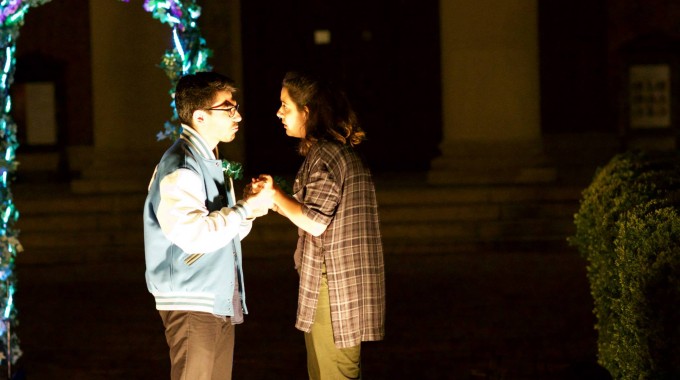If you know of a Columbia College student, faculty member, alumnus/alumna or program we should spotlight, or if you would like to submit a story, please contact:
Columbia College
Office of Communications
cc-comms@columbia.edu

“KCST brings challenging, socially aware theatre to the Columbia community.” — Jenna Lomeli CC’15
Though it may seem counter-intuitive, not all theater is found inside a theater.
Unlike the proscenium-centric approach of many theatrical productions, the King’s Crown Shakespeare Troupe (KCST), a Columbia student theater group, produces a show performed outdoors each spring, with Columbia’s campus as its stage. The plays unfold as the audience follows the cast, traveling from location to location, forced to walk and sometimes even to run.
At KCST's spring 2015 production of Much Ado About Nothing, for example, the audience found themselves watching the show’s opening scene, which takes places in 16th century Italy, from the Charles H. Revson Plaza, a campus bridge over Amsterdam Avenue, the sunset overhead and the bustling sound of New York City’s 21st century traffic below.
KCST, which has been producing a traveling Shakespeare production since 1995, operates under the idea that this approach to staging creates an experience that feels more authentic to audience members than a show on a traditional stage.
 The cast of KCST's Spring 2015 production in the show's final scene. Photo: Jo Chiang
“Any production in real space takes place on real structures, real stone, [with] real buildings behind it,” says Alex Dabertin CC’15, who co-directed KCST’s spring 2015 production of Much Ado About Nothing with Rachel Chung SEAS’15. “It’s right in front of you; you have to deal with it. It becomes… an experience that affects people more fully.”
The cast of KCST's Spring 2015 production in the show's final scene. Photo: Jo Chiang
“Any production in real space takes place on real structures, real stone, [with] real buildings behind it,” says Alex Dabertin CC’15, who co-directed KCST’s spring 2015 production of Much Ado About Nothing with Rachel Chung SEAS’15. “It’s right in front of you; you have to deal with it. It becomes… an experience that affects people more fully.”
“KCST brings challenging, socially aware theatre to the Columbia community,” says Jenna Lomeli CC’15, who has acted in KCST productions since her first year at Columbia. “The Columbia community brings passionate, socially aware people to KCST, and it pushes us to be more thoughtful and critical about the art that we make.”
For the spring 2015 production, which also represented the 20th anniversary of KCST’s traveling shows, the troupe “wanted students to come out of [the show] thinking about the way that they treat other people on campus,” says Chung. To achieve this, Dabertin and Chung chose to change the play’s ending: Hero, who marries Claudio in the Shakespearian ending of the play, chooses to turn him down in KCST’s adaptation.
Though not afraid to take liberties with the original scripts, KCST takes its approach to Shakespeare seriously. “KCST is centered around scholarship and really understanding Shakespeare, [as well as] being really committed to doing challenging work,” says Chung. The troupe also believes in inclusivity; along with their spring show, KCST produces up to three indoor shows each year, and both semesters’ productions include the work of anywhere from 35 to 50 students. For the spring show, everyone who auditions is cast. “Over the past few years we’ve seen a large influx of people of diverse background[s],” says Dabertin. “Just by being open, and thoughtfully casting shows, we’ve become a lot more inclusive [of] the voices that can be heard at Columbia.”
Philip Anastassiou CC’18, a member of Much Ado About Nothing’s cast who joined KCST during his second semester on campus, was initially attracted to the group’s openness. “Once you've participated in any capacity in a production of ours, you are considered a troupe member for life,” he says. “This is the sort of welcoming mentality that binds our troupe together.”
In an attempt to extend their inclusivity, KCST’s productions are free. “The fact that it's free is . . . very important to [us],” says Percy Stubbs CC’15, also a member of the Spring 2015 cast. “It’s a political and cultural statement that students can not only do this great theater, but can do it for free with the help of . . . university support.”
In all of its productions, KCST strives to construct what Dabertin explains as “a discussion between everybody on campus. . . a common language between all of us.” This is a goal he credits to the spirit of the Core Curriculum.
“The Core creates, if you’re willing to really engage with it, a conversation about something between everybody . . . and a lens to see the problems of our current lives,” says Dabertin. He hopes that KCST, at its best, does the same.
Sally Whalen CC’17, from Spokane, Washington, is a student web editor for the Columbia College website.